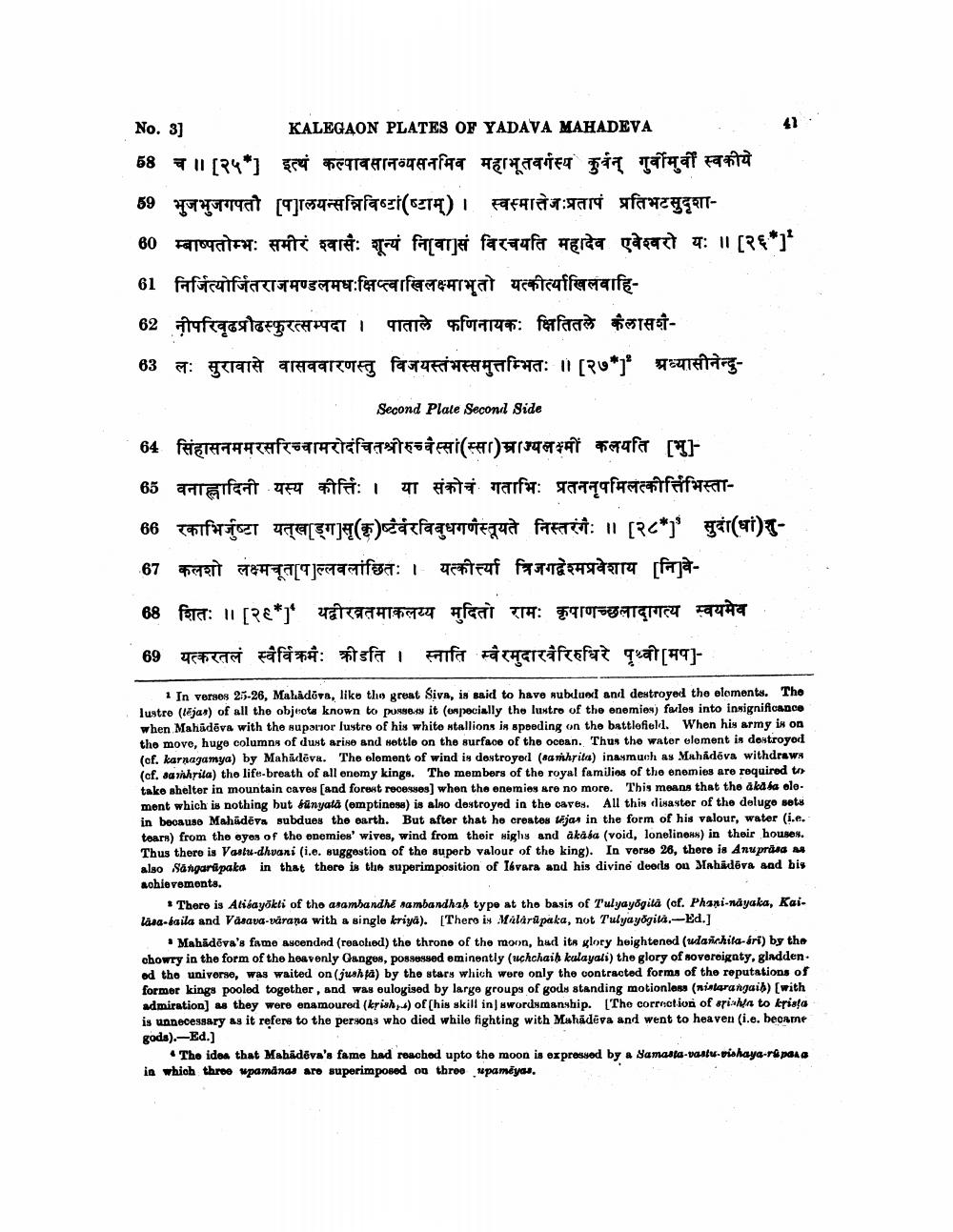________________
No. 3]
KALEGAON PLATES OF YADAVA MAHADEVA
68 ।। [२५] इत्यं कल्पावसानव्यसनमिव महाभूतवर्गस्य कुर्वन् गुर्वीमुर्वी स्वकीये
59 भुजभुजगपती [प]लयन्सन्निविष्टां (टाम्) । स्वस्मात्तेजः प्रतापं प्रतिभटसुदृशा
60 म्बाष्पतोम्भः समीरं श्वासैः शून्यं निवासं विरचयति महादेव एवेश्वरो यः ।। [ २६* ]
61 निर्जित्योर्जितराजमण्डलमधः क्षिप्त्वा खिलक्ष्माभूतो यत्कीर्त्याखिलवाहि
62 नीपरिवृढप्रौढस्फुरत्सम्पदा । पाताले फणिनायकः क्षितितले कैलासशै
63 लः सुरावासे वासववारणस्तु विजयस्तंभस्समुत्तम्भितः ॥ [ २७* ] अध्यासीनेन्दु
41
Second Plate Second Side
64 सिंहासनममरसरिच्चामरोचितश्रीरुवै स ( स ) आपलक्ष्मीं कलयति [भु]
65 वनाह्लादिनी यस्य कीर्त्तिः । या संकोचं गताभिः प्रतननुपमिलत्कीर्तिभिस्ता
66 रकाभिर्जुष्टा यत्याग] (कृ) प्रविबुधगणंस्तूयते निस्तरंग ॥ [ २८*] सुदा (धांशु67 कलशो लक्ष्मत[]ल्ल लांछितः । यत्कीर्त्या त्रिजगद्वेश्मप्रवेशाय [निवे
68 शितः ।। [ २६*
यीरव्रतमाकलय्य मुदितो रामः कृपाणच्छलादागत्य स्वयमेव
69 यत्करतलं स्वैर्विक्रमैः क्रीडति । स्नाति स्वैरमुदारवैरिरुधिरे पृथ्वी [मप]
1 In verses 25-26, Mahadāva, like the great Siva, is said to have subdued and destroyed the elements. The lustre (lejas) of all the objects known to possess it (especially the lustre of the enemies) farles into insignificance when Mahadeva with the superior lustre of his white stallions is speeding on the battlefield. When his army is on the move, huge columns of dust arise and settle on the surface of the ocean. Thus the water element is destroyed (of. karaagamya) by Mahadeva. The element of wind is destroyerl (samhrita) inasmuch as Mahadeva withdraws (cf. samhrila) the life-breath of all enemy kings. The members of the royal families of the enemies are required to take shelter in mountain caves [and forest recesses] when the enemies are no more. This means that the akasa element which is nothing but sunyata (emptiness) is also destroyed in the caves. All this disaster of the deluge sets in because Mahadeva subdues the earth. But after that he creates tejas in the form of his valour, water (i.e. tears) from the eyes of the enemies' wives, wind from their sighs and akasa (void, loneliness) in their houses. Thus there is Vastu-dhvani (i.e. suggestion of the superb valour of the king). In verse 26, there is Anupräsa as also Sangarapaka in that there is the superimposition of Iévara and his divine deels on Mahadeva and bis achievements.
s There is Atiáayōkti of the asambandhe sambandhah type at the basis of Tulyayōgita (of. Phani-nāyaka, Kailana-baila and Vasava-varana with a single kriya). [There is Malarapaka, not Tulyayogita.Ed.]
* Mahādēva's fame ascended ( reached) the throne of the moon, had its glory heightened (udanichita-ári by the chowry in the form of the heavenly Ganges, possessed eminently (uchchaiḥ kalayali) the glory of sovereignty, gladden. ed the universe, was waited on (jushta) by the stars which were only the contracted forms of the reputations of former kings pooled together, and was eulogised by large groups of gods standing motionless (nistarangaih) [with admiration] as they were enamoured (krish) of [his skill in swordsmanship. [The correction of arisha to krista is unnecessary as it refers to the persons who died while fighting with Mahadeva and went to heaven (i.e. became gods).-Ed.]
• The idea that Mahadeva's fame had reached upto the moon is expressed by a Samasta-vastu vishaya-rupaka in which three upamanas are superimposed on three upamēyas.




